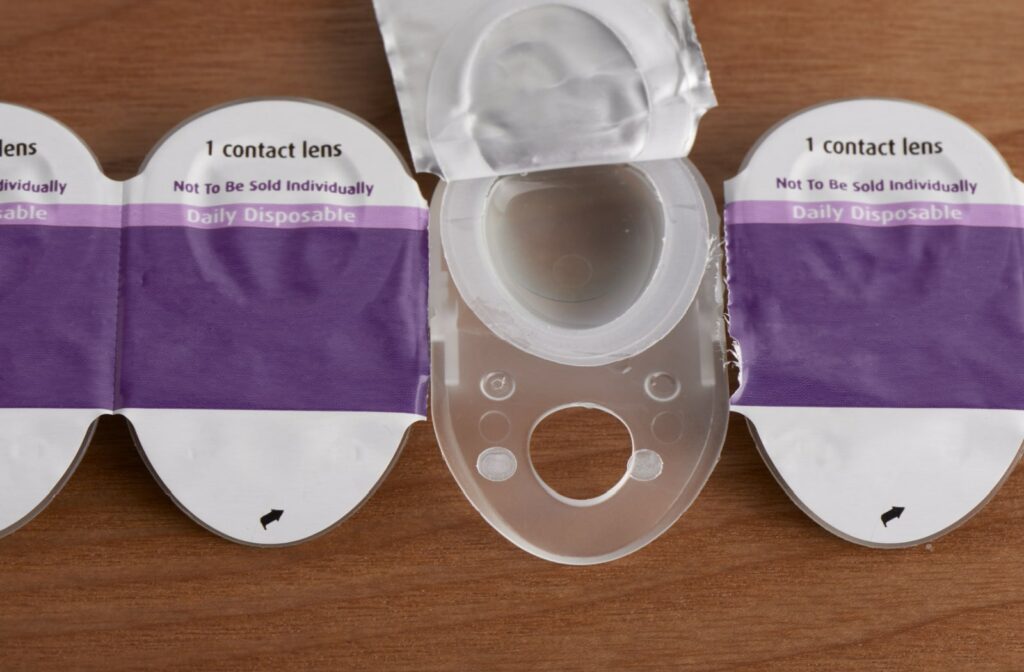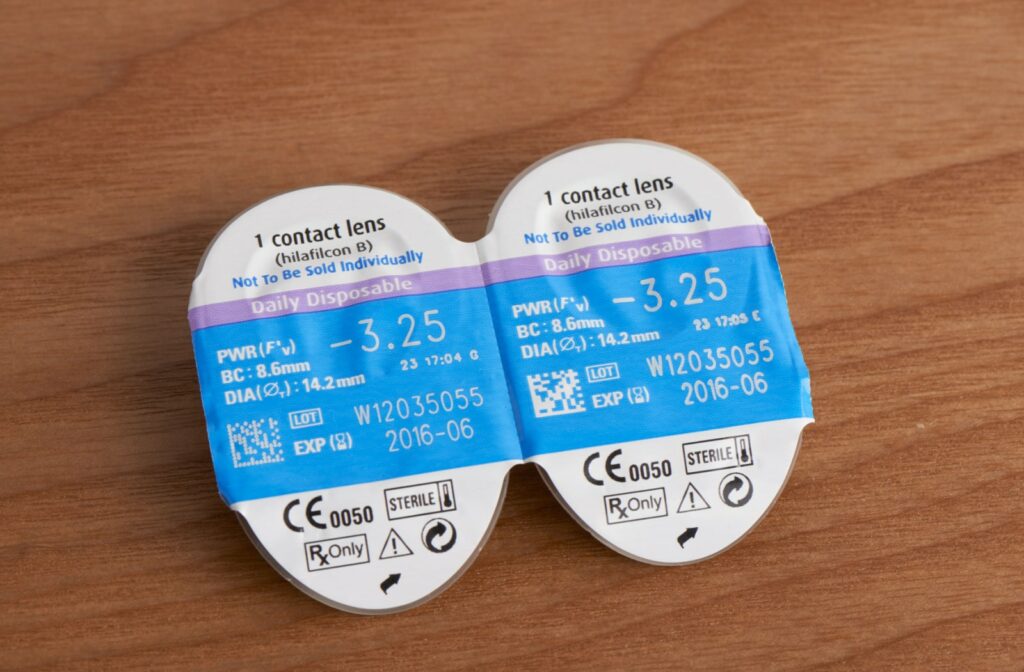Contact lenses can be an essential tool in improving your vision. Whether you have astigmatism, nearsightedness, farsightedness, or presbyopia, contact lenses can help you correct your vision without eyeglasses.
However, it can be easy to overlook the expiration dates on contact lenses, especially when it seems like they’re still in good condition. Contact lenses expire, but properly caring for them can help protect you from discomfort or the risk of eye infections.
How Can Contact Lenses Go Bad?
Contact lenses won’t turn brown like old apples, but they must remain sterile to stay effective and safe. This is why soft contact lenses come in blister packs filled with saline solution.
The manufacturers seal these packs airtight to protect the lenses from bacteria creeping in. When you get your box, take a look around the outside. There should be a date when the pack will no longer be good. This is the manufacturer’s best guess when the seals might fail or the solution loses its disinfecting properties. Once this date passes, it’s better to toss the box and get yourself new lenses.
If the blister pack seal comes undone, it opens the contacts to all sorts of contaminants. Hopefully, the cleaning solution can still protect the lenses, but in time, the disinfecting ingredients become inert and ineffective. Without these protections, bacteria can grow on the lenses, which you will not want to put in your eyes. So, watch out for that expiration date.

How Long Are Contact Lenses Good for after Opening?
The expiration date is a good indicator of when you should get rid of the box, but what about the lenses you’re currently using? Some lenses are used immediately after opening and thrown away at the end of the day (dailies), but other types are designed to be cleaned, stored, and reused.
The amount of time you should wear your lenses depends on their type. Wearing lenses longer than this schedule could make your lenses less effective—or even damage your eyes.
Types of Soft Contact Lenses
Most contact lens wearers use soft lenses because they are often more comfortable and require less adjustment than hard contacts. Soft contacts are sometimes called disposable lenses, as many are thrown away after a certain time. Always check the box for information, and talk to your optometrist about the type of lens you’re using.
- Disposable lenses are worn throughout the day and then removed at night. Depending on the type, you either discard them at the end of the day or clean, store, and reuse them for up to a month before throwing them away.
- Extended-wear lenses are designed to be worn day and night over several days before needing to be removed and either thrown out or cleaned and reinserted. Though these lenses are approved by Health Canada, optometrists suggest you still remove them every day.
While soft contacts are generally more comfortable due to their hydrogel material, they can also act like sponges for bacteria and proteins, meaning contaminants from expired solution can attach to the lens and transfer to your eyes.
Do Rigid Gas-Permeable (RGP) Lenses Expire?
Soft lenses are popular, but rigid gas-permeable (RGP) lenses have advantages. They are more durable and can offer sharper vision than soft lenses. They are often more effective for “hard-to-fit” eyes, like those with astigmatism or dry eye disease.
RGP lenses are usually worn throughout the day and removed and cleaned at night. Since they’re built to last, they are more resistant to deposit buildup than soft lenses. RGP lenses don’t always have expiration dates, and a pair of RGP lenses can last for 2–3 years if you treat them well.
However, you can still overwear RGP lenses. If worn for too long, bacteria can get trapped between the lens and the eye, increasing your risk of eye infections. Replace your case every 3 months and clean your lenses with the correct solution. Using the wrong solution can damage them and reduce their lifespan.
What Happens If I Wear Expired Lenses?
Since contact lenses sit directly on our eyes, they come with some risks. Treat them well and keep them clean so your lenses can help you see the world.
Watch out for these symptoms that may mean you have an eye infection:
- Eye pain
- Red eyes
- Light sensitivity
- Watery eyes
- Blurry vision
- Mucus discharge
- The feeling of a foreign object stuck in your eye
Let your eye doctor know if you recognize any of these symptoms. We can stop eye infections before they get too serious, but it’s up to you to let us know. With an early diagnosis, we can keep your eyes healthy and happy.
Contact Lenses for the Whole Family
Not only do contact lenses expire, but so too do eyewear prescriptions. A prescription is typically valid for 1 year and never longer than 2. If your prescription changes, the contacts you rely on may not work how you need them to. This may not be as dangerous as an eye infection, but it can be just as frustrating.
So let’s keep ahead of it! The Advance Eye Care Center team is passionate about eye health in Regina, which includes properly fitted contact lenses. Even if you have “hard-to-fit” eyes, our team is excited to help you find your favourite pair with a comprehensive contact lens fitting. So book yours today, and let’s keep the future bright.





